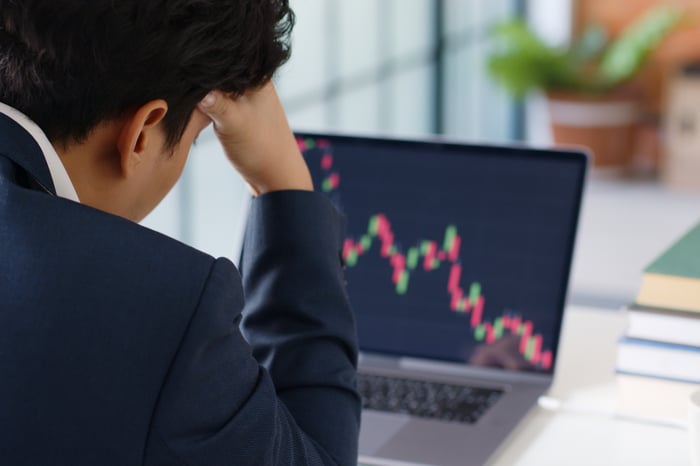Cathie Wood is an institutional investor who has gained a following among retail investors. Wood's ARK Invest manages several extremely popular exchange-traded funds (ETFs) and their popularity is understandable given their strong performance. For example, the ARK Innovation ETF (ARKK -0.33%) has more than tripled the S&P 500's annualized performance since its inception in 2014.
Wood has the respect of retail investors, including this one. However, I fear investors will implement a losing strategy in 2022 based on headlines I've been seeing related to a recent interview with Wood. ARK Invest is apparently testing something called "ARK on steroids" and I have a sinking feeling that many investors will try to juice their returns as well.

Image source: Getty Images.
When you're down in the dumps
My portfolio is down in the dumps right now. Is yours? Many of 2020's high-flying stocks have fallen precipitously over the past few months. And that's been true of the stocks in the ARK Innovation ETF as well. Even though it's outperformed by a wide margin since inception, it's down about 17.4% year to date whereas the S&P 500 is up nearly 25%.
On Nov. 24, Wood gave an interview with CNBC and said that ARK Invest is testing something referred to as "ARK on steroids." The new approach would incorporate shorting stocks in addition to buying stocks for the long term. And while ARK Invest's recent underperformance wasn't brought up, I can't help but wonder if "ARK on steroids" is being motivated by slumping results in some way.
Slumping results motivate people to unnecessarily modify their investing strategy because financial losses are painful. Summarizing a scientific study from Wellcome Trust, ScienceDaily said, "Losing money may be intrinsically linked with fear and pain in the brain." Whether you're a retail investor like me or an institutional investor like Wood, these emotions have likely been triggered if your portfolio is drastically down right now.
Furthermore, pain is a stressor and stressors naturally activate responses in our brains. In an academic paper published in the Current Opinion in Behavioral Sciences journal on the effects of stress on decision-making, authors Anthony Porcelli and Mauricio Delgado write, "stress exposure influences ... our propensity to engage in risk taking." They go on to write, "risk-taking increases when decisions are framed as potential financial gains."

Image source: Getty Images.
What to do right now
When I was a kid, our TV was attached to an antenna we called "bunny ears." The signal would often be too fuzzy to watch anything and so one of us would get up and start adjusting the antenna. There wasn't any rhyme or reason to how we moved the bunny ears. We just kept doing it until something worked.
Investing can be that way sometimes. When things aren't working, we're willing to wiggle the bunny ears until something does. The cited studies suggest that investors are currently feeling pain, are ready to take on extreme risk to stop the pain, and will justify risky approaches by thinking about the potential financial reward. Therefore, "ARK on steroids" headlines could be misused by investors looking for confirmation to adapt their approach to more risky and more short-term strategies that have higher perceived upside.
To be clear, Wood and ARK Invest are still investing for the long term. In the interview with CNBC, Wood said it was important to keep a five-year investing horizon. Furthermore, the steroids approach is being tested before it's rolled out in ETFs for the public. Because of this, I'm not saying that "ARK on steroids" will be a failure.
I am saying that 2021 has been painful and scary for many investors. But pain and fear shouldn't motivate you to make bold, risky changes to your portfolio going into 2022. Investing in 2022 shouldn't be any different than investing in 2021. Identify companies poised to create shareholder value, buy their stocks, and hold them for a really long time while enduring market volatility along the way.
Trust me, enduring volatility is worth it. Despite everything that's happened during the past decade, the S&P 500 is up close to 275%. But it's pulled back at least 10% on five different occasions in that decade -- that's volatility.
When these pullbacks happen, it feels like we're being punished for making mistakes. But in reality, 10% pullbacks are just part of the path to 300% gains. In The Psychology of Money, author Morgan Housel says, "thinking of market volatility as a fee rather than a fine is an important part of developing the kind of mindset that lets you stick around long enough for investing gains to work in your favor."
This is the takeaway. Fear and pain motivate you to make changes that can ultimately take you out of the game. Embracing volatility before it strikes can therefore mitigate its influence, helping you stay the course.




